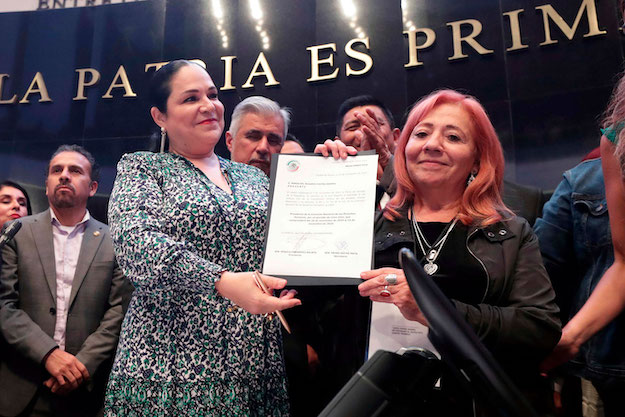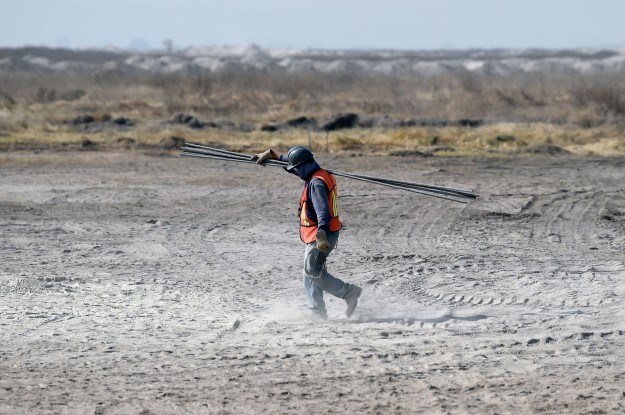MEXICO CITY – Little by little, Mexico’s ship of state is coming to resemble its captain.
On Nov. 12, Rosario Piedra Ibarra, an activist and long-time ally of Mexico’s President Andrés Manuel López Obrador, was sworn in as head of the country’s National Human Rights Commission (CNDH). Prior to taking over, Piedra had criticized the agency for having “simulated” its fight against human rights abuse under previous administrations. She has promised the same kind of restructuring and “rescue” of the agency that AMLO, as the president is known, has pursued throughout government since his election last year.
For AMLO’s opposition in Congress, Piedra’s nomination was problematic from the start. Her evident admiration for the president led many to suggest she was unfit for a role monitoring his government for potential abuse. They see Piedra’s appointment as just the latest in AMLO’s efforts to bring a wider swath of government bureaucracy under his control.
“The administration’s appointments since taking office show a desire to diminish independent institutions, to sap them of their importance by putting them in the hands of people who are very close to the government or who are unqualified for the job,” Martha Tagle, a congresswoman and former senator for the opposition Citizens’ Movement (MC) party, told AQ.
But despite best efforts, opposition senators were unable to take advantage of a prime opportunity to prevent Piedra’s appointment. If nominally opposition legislators from the PAN, PRI, PRD and MC parties had voted as a bloc, the president’s congressional allies would have been at least eight votes short of the two-thirds majority needed to confirm the nomination.
Instead, a heated session in which Piedra’s nomination was approved by a single vote led to opposition accusations of fraud. When Piedra was sworn in, protesting senators sparked a shoving match on the chamber floor. Five members of the CNDH’s advisory council have resigned over her appointment.
Piedra’s position on the commission may not be totally secure – the PAN and others have promised legal action based on claims that her leadership role in AMLO’s Morena party should have prevented her nomination in the first place.
But in its attempts to limit the president from consolidating influence, the opposition’s divergent interests have already carried a cost.
“The government has known what buttons to push (with opposition parties) to further its agenda,” Gustavo Almaraz, executive director at Grupo Estrategia Política, a consultancy, told AQ. “Some parties have stayed close to the government, either for their own survival or out of political expedience. Others have just struggled to come up with a clear agenda.”
Political arrangements of the kind that apparently gave Morena the votes it needed to approve Piedra’s nomination leave opposition legislators playing the part of “extras,” Tagle said. What’s more, the CNDH vote was held on a secret ballot, giving the public little opportunity to know who or what parties allowed the appointment to go forward.
“The secret ballot was designed to help prevent political parties from putting pressure on their members, but in this case it did the opposite,” Tagle said.
With the opposition often working at cross-purposes, AMLO has been able to have his way with Mexico’s independent institutions. Since taking office in December, the president has used his daily morning press conferences to criticize independent bodies, such as the CNDH and Mexico’s national transparency agency, as window dressing used by previous presidents to give the appearance of good governance.
López Obrador has also named the wife of a close personal adviser to a seat on the Supreme Court, fired the head of an agency that evaluates social policy shortly after the technocrat in question wrote an op-ed criticizing the president’s budget cuts, and forced through the appointment of allies with little technical experience to two key energy regulatory commissions. (In the last case, AMLO’s congressional opponents did block his nominations, but procedural rules allowed him to make the appointments anyway.)
That may just be the start. The resignation of former Supreme Court Justice Eduardo Medina Mora on Oct. 3, under a cloud of corruption allegations and, reportedly, government pressure, means that in 2021 AMLO will have named at least four of 11 sitting Court justices. His nominees on their own would be able to block certain constitutional challenges that require eight votes to approve.
Critics are also concerned over recent proposals by Morena to reform the National Electoral Institute in ways that could give AMLO appointees more control over the agency and the running of future elections.
“Mexico doesn’t generally have very strong institutions,” Rodolfo de la Torre, director of Mexico City-based think tank CEEY, told AQ. “In the months ahead we’re going to see which of them can withstand real political pressure.”
AMLO’s attempts to exert influence over Mexico’s independent institutions are not entirely new. Previous PRI and PAN presidents also named close allies to the Supreme Court and other institutions, including the CNDH. But López Obrador, who promised that his election would bring about a transformation in Mexican public life, has so far “repeated old patterns, perhaps with less concern for appearances,” De La Torre said.
Meanwhile, López Obrador’s congressional opposition has yet to rally around a cohesive agenda to slow the president down.
“Right now our political discourse is all or nothing, for or against,” said Tagle. “There’s no allowance for intermediate positions, or for being critical without being considered ‘against’ the government … A constructive opposition agenda is hard to build on that kind of polarization.”
—
Russell is a senior editor and correspondent in Mexico City for AQ. Follow him on Twitter @BenPaulRussell








